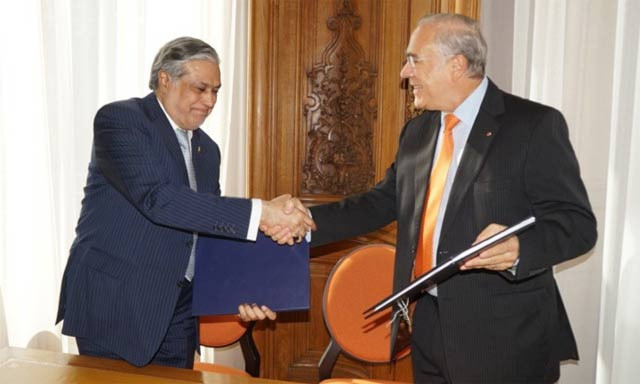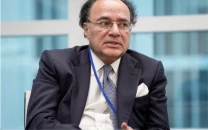Pakistan officially becomes signatory of OECD Convention
Convention aims to curb tax evasion, federal cabinet has given approval

Convention aims to curb tax evasion, federal cabinet has given approval. PHOTO SOURCE: TWITTER @PML-N
Finance Minister Ishaq Dar signed the Convention on Wednesday along with OECD Secretary General Angel Gurria in Paris, which the government claims is a testimony of its commitment to adopt international best practices in the field of tax matters.
‘OECD will invite Pakistan to become signatory’
However, while independent tax experts say it is a good step, a lot will depend on the domestic laws of respective member countries. The other factor is that the convention will not come into force at once, as the OECD plans to roll out the multilateral treaty gradually.
The federal cabinet has already given approval and its ratification will now be required before Pakistan becomes an active beneficiary of the convention.
It will take at least one year to complete the procedural requirements from both sides, said an official of the Federal Board of Revenue (FBR).
So far more than 103 countries have become signatories of the OECD Convention on Mutual Administrative Assistance in Tax Matters. As many as 54 countries will put in place their domestic mechanisms in 2017 for the first exchange of information. Another 47 countries will start first exchange of information in 2018.
Pakistan may get the first access to information by either the end of 2018 or early 2019, according to officials involved in negotiations.
The countries or the jurisdictions where Pakistanis are perceived to be hiding their wealth will start exchanging information in either 2017 or 2018 with the OECD member countries.
Among them, tax havens like British Virgin Islands, Isle of Man, Jersey, Liechtenstein and United Kingdom will start exchange of information by September 2017. Switzerland and Malaysia will start exchange of information by September 2018, according to the information available on the OECD website.
“The Convention would facilitate international cooperation on national tax laws and provide administrative cooperation among member countries to combat tax evasion,” according to the Ministry of Finance.
The OECD and the Council of Europe jointly developed the Convention in 1988 and amended by Protocol in 2010. It is the most comprehensive multilateral instrument available for all forms of tax co-operation to tackle tax evasion and avoidance but with its own limitations.
“It is not a multilateral convention in its true spirit, as member countries are governed by their domestic laws,” said Dr Ikramul Haq, an expert in international tax matters and advocate of the Supreme Court of Pakistan.
He said that availability of information would depend upon the domestic banking laws of each member country. Dr Haq said that there is also limitation on fiscal exchange of information, as it is not wide open as generally is perceived.
He said that despite having legal provisions, the FBR has so far failed to obtain information about Pakistani bank account holders due to resistance by domestic banks.
Pakistan to sign tax agreement with OECD
Secondly, legal lacunas, like Economic Reforms Protection Act of 1992 and sections like section 111 (4) of Income Tax Ordinance are barriers to meaningful action against tax evaders.
“A key aspect for making tax administration ready for the challenge of the 21st century is equipping them with the necessary legal, administrative and information technology tools for verifying compliance of their taxpayers,” he added.
Dr Haq said that against this background, enhanced cooperation between tax authorities through Automatic Exchange of Information (AEOI) is crucial in bringing national tax administration in line with globalised economy.
The OECD invitation to Pakistan to sign the convention was made possible after a long process of over two years, which included peer reviews and amendments in Pakistani domestic income tax laws to meet the requirements of OECD. In March 2014, Pakistan sent a formal request to the OECD Secretariat for becoming signatory of the convention.
According to other experts, there will be three portals of exchange of information. The automatic portal, having pre-determined mechanisms, would provide information without request from the member countries.
The OECD stresses upon confidentiality of the tax returns and taxpayers information. It also seeks assurances on secrecy of information exchanged by the member countries.
Published in The Express Tribune, September 16th, 2016.
Like Business on Facebook, follow @TribuneBiz on Twitter to stay informed and join in the conversation.



















COMMENTS
Comments are moderated and generally will be posted if they are on-topic and not abusive.
For more information, please see our Comments FAQ